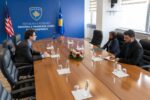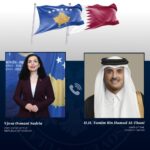Moldovan authorities revealed that several individuals arrested yesterday were trained in Serbia by Russian operatives to provoke unrest in Moldova, just days before the country’s crucial parliamentary elections on September 28.
According to Radio Free Europe, participants underwent training that included breaking through police cordons, resisting security forces, and using rubber batons, handcuffs, and even firearms. Each trainee reportedly received €400 per session.
Over 100 Suspects Identified
The Chief Prosecutor from the Office for Combating Organized Crime and Special Cases, Victor Furtună, stated that the investigation began in June. So far, 111 individuals have been identified as connected to the plot, while 74 remain in custody for 72 hours. Authorities believe these people received training organized by Russian nationals in Serbia.
Russian Coordination Behind the Plan
Moldovan Police Director Viorel Cernăuțeanu said the operation was coordinated directly from Russia through criminal networks. The trainings in Serbia were led by a man nicknamed “Bes”, who presented himself as a member of Russian special services.
Another organizer, Andrey Pavlov, an officer from Russia’s Ministry of Defense, has previously been implicated in subversive activities across the EU, Asia, and Africa.
Links to Political Parties and Criminal Groups
Investigations also uncovered ties between the recruits and certain Moldovan political parties as well as organized crime groups. Some training sessions reportedly took place inside Moldova, while the “Șor” party network was allegedly used for recruitment.
Interestingly, some detainees did not know the real purpose of their trip to Serbia. They believed they were going on a religious pilgrimage, only to later find themselves enrolled in paramilitary-style training.
A Critical Moment for Moldova
These revelations come just days before Moldova’s parliamentary elections, where citizens will decide whether to continue the country’s pro-EU course or strengthen ties with Russia.
Moldovan officials have long accused Moscow of conducting a “hybrid war” against the country, including election interference, disinformation campaigns, and illegal financing of pro-Russian parties. The Kremlin, however, consistently denies such claims.
Following Russia’s full-scale invasion of Ukraine in 2022, Moldova applied for EU membership and obtained candidate status the same year. Negotiations formally opened in 2024, deepening tensions with Moscow.







